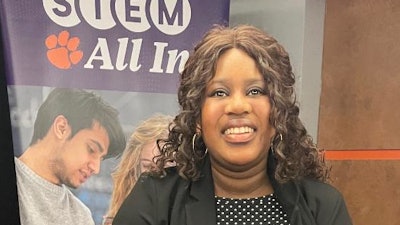 Lidadi Agbomi
Lidadi Agbomi
“She is diligent, self-disciplined, and self-motivated,” said Dr. Nishika Edwards, educational research program coordinator at the University of South Carolina’s School of Medicine, Greenville, in the department of biomedical sciences.
Agbomi has worked closely with mentors there to investigate and research self-organizing neural units to model ischemic stroke and other neuropathology. Agbomi has also worked on analyzing data of the disruption of the extracellular morphogenesis of cardiac tissues in two avian models of cyanotic heart defects.
“As a researcher, she’s meticulous in her approach and very studious as well,” said Edwards.
Agbomi, who completed her bachelor’s degree at Clemson, first credits Jesus, her Lord and Savior, without whom she said she would not have been able to accomplish what she has done the past two years. She also acknowledges the supportive network of people, including her parents, who have been there for her during her undergraduate studies.
Throughout her life, Agbomi has dealt with asthma and eczema, which brought her into close contact with many doctors and sparked her fascination with science. She entered her undergraduate education planning on becoming a physician, most likely an immunologist, to address issues of asthma and other autoimmune diseases.
“I went into my undergrad doing bioengineering and premed, and then once I got the opportunity to do research it opened my eyes to a different side of bioengineering,” Agbomi said. “It excited me so much I actually finished everything for my premed requirements, but I decided to pursue a Ph.D. instead.”
Her participation in the NIH R25 program enabled her to engage in research with Dr. Thomas Nathaniel at the University of South Carolina, School of Medicine, Greenville. This subsequently led to Agbomi also working in the lab of Dr. Eric McLamore at Clemson, making biosensors for testing COVID-19. “I was able to be doing two completely different types of research, which allowed me to figure out what I want to do myself,” she said.
Agbomi’s interest areas involve tissue engineering, which will be her research for graduate school. “I very much like the brain, so I’ve been looking at Alzheimer’s and strokes, being able to learn more about the brain and understand it more,” Agbomi explained. “Now, using my knowledge to apply it to creating a model of the brain that can be used for testing different things. … We’re creating an environment that acts like the human brain.”
Agbomi has received several honors, including the NIH NIA Outstanding Scholar Award. She looks forward to learning more about the human brain and giving back to the communities that have helped her. This year, she’s a student ambassador for the NIH R25 program. The PEER&WISE program at Clemson, which endeavors to increase the number of women and minorities in STEM fields, is also part of her plans.
“The people at the PEER&WISE program were like a second family to me and helped me out so much throughout my entire time at Clemson, and I was able to give back during my undergraduate as a tutor there,” she said. “I want to continue working with them because they very much changed my life for the better.”
After completing her doctorate, Agbomi said she hopes to work in industry creating new devices and materials that can help with Alzheimer’s and strokes, but she’s also interested in academia. “It’s up in the air,” she said, “but I’m interested in both.”















